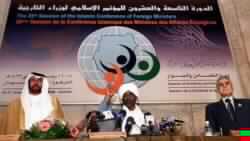Islamic Conference Organization Discusses Anti-Islamic Backlash, Mideast
26/06/2002| IslamWeb
 HIGHLIGHTS: Bashir Warns Islamic World Risks Being Further Marginalized if They Fail to Bridge the Gap with The Industrialized World||Qatar Hopes Bush's Mideast Statement Would Help End Conflict in the Middle East||Belqaziz: 'Adding Insult to Injury Muslims Are now Being Accused of Being Terrorists'|| STORY: Muslim leaders shined a critical light on the state of their nations Tuesday, with Sudan's president saying they risk being "even more marginalized" if they fail to close social and economic gaps with developed nations. (Read photo caption)
HIGHLIGHTS: Bashir Warns Islamic World Risks Being Further Marginalized if They Fail to Bridge the Gap with The Industrialized World||Qatar Hopes Bush's Mideast Statement Would Help End Conflict in the Middle East||Belqaziz: 'Adding Insult to Injury Muslims Are now Being Accused of Being Terrorists'|| STORY: Muslim leaders shined a critical light on the state of their nations Tuesday, with Sudan's president saying they risk being "even more marginalized" if they fail to close social and economic gaps with developed nations. (Read photo caption)
President Omar el-Bashir also called for reform of the Organization of the Islamic Conference (OIC) in opening remarks to foreign ministers and senior officials from the 57 Muslim nations meeting in the Sudanese capital.
El-Bashir, who came to power in a 1989 coup, said the Muslim world had no choice but to develop its capabilities "to bridge the historic gap between backwardness and development, weakness and strength."
"Unless we do that," he warned, "we shall be reduced to neglected numbers and a quantity that is even more marginalized than we are at present."
Addressing the meeting in his country's capacity as current Chairman of the OIC, H.E. the foreign minister of Qatar Sheikh Hamad Ben Jassim Ben Jabor Al-Thani pointed out the meeting is held at a turning point in human history where the world is witnessing great upheaval on all levels-a fact his excellency emphasized, that nictitated that all OIC member states join hands with the rest of the international community to seek solutions facing the globe.
SH Hamad Ben Jassim also underlined total support to the Palestinian people in their just struggle for statehood and expressed the hope that President Bush's Mideast statement Monday would help in finding a final solution to the conflict which ultimately, he added, should lead to Israel's agreement to end occupation of Arab land including East Jerusalem, the Syrian Golan Heights and Southern Lebanon's Shebaa Farms.
Abdelouahed Belkziz, the Moroccan secretary-general of the OIC, warned that Muslims run the risk of losing self-confidence and of self-imposed international isolation because of an unfair linkage of Islam to terrorism.
"Muslims in the past had been associated with poverty and ignorance and accused of lacking democracy and respect for human rights," he said. "Now they face the additional accusation of being followers of a backward civilization and a culture that glorifies death. In other words, a culture of terrorism."
"The task of countering these challenges is made easier because they are based on false and vicious accusations that are not difficult to expose," Belkziz added.
The OIC, based in the Red Sea port city of Jiddah, Saudi Arabia, is the world's only pan-Islamic body and, in theory, represents an estimated 1.2 billion Muslims living from West Africa to the Far East and from Russia to the Comoros Islands in the Indian Ocean.
The 30-year-old body, however, has been little more than a forum for debate, and it needs reform, el-Bashir said.
"A Western backlash against Islam after the Sept. 11 attacks in the United States should prompt swift changes needed to lead joint Islamic endeavors toward the horizons we all aspire for," el-Bashir said.
The OIC was founded out of Muslim indignation over a 1969 fire at Jerusalem's al-Aqsa Mosque, one of Islam's holiest shrines. A Christian man from Australia was accused of starting the fire, but Muslims held Israel responsible since it controlled the holy city.
The Israeli-Palestinian conflict has always been central to the organization, and the three-day gathering in Khartoum Voiced solid support for the Palestinians and withering criticism of Israel.
The meeting began a day after President Bush urged the Palestinians in a long-anticipated speech to replace the Palestinian leadership with those "not compromised by terror" and to adopt democratic reforms that could produce an independent state within three years.
He also called on Israel to stop building settlements in the West Bank and said the Jewish state will ultimately have to withdraw from lands it occupied in the 1967 Middle East war.
PHOTO CAPTION
Sudanese President Gen.Omar al-Bashir, center, waves as he announces the opening session of the 29th Islamic Conference of Foreign Ministers in Khartoum Tuesday, June 25, 2002. Qatari Foreign Minister, Hamad Ben Jassim (L) hoped Mideast Bush Statement would serve as a base to a Mideast political settlement. OIC Chief, Abdelouahed Belkziz (R) said all accusations against Islam are easy to fend off simply because they're false. (AP PHOTO/Amr Nabi
www.islamweb.net
